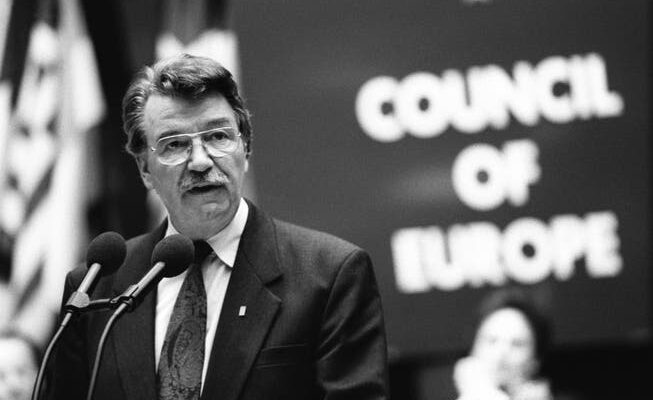In 1992, the Federal Council wants to have a greater say in the world. Diplomatic documents now provide an insight into the debates of the time – for example about the future of Swiss neutrality.
Good time for multilateralism: Foreign Minister and Federal President René Felber speaks at the Council of Europe in Strasbourg in March 1992.
For Swiss foreign relations, 1992 was not only the year of the no to the EEA, but also the year of a positive referendum. Although the accession to the International Monetary Fund (IMF) and the World Bank, which was approved on May 17 against opposition from left and right, can be seen as normalization, a traditional skepticism about multilateral ties had to be overcome. The new volume in the “Swiss Diplomatic Documents” series, which, with 62 pieces of file, offers a cross-section of a widely understood foreign policy and serves as an introduction to 1,700 electronically accessible documents, illustrates not least how Switzerland entered the two financial institutions.
No “folding seat” in the World Bank
The latecomer does not want to be satisfied with a “folding seat”, but wants to have a say in the inner circle. With “doggedness”, as one of those involved writes, Swiss diplomacy is fighting for the formation of its own constituency and for the creation of an additional seat in the two governing bodies. The emergence of new states through the dissolution of the Soviet Union and Yugoslavia is fortunate as it sets things in motion. However, Bern has to face resistance from the US, which wants Switzerland to pull in the Maghreb states and thus break up the Iran-led group. Under American pressure and because Switzerland had not proven to be a reliable partner when it came to arms deliveries, Turkey jumped out of the planned group shortly after its participation seemed “definitely secured”. However, Poland and four former Soviet republics are enough to achieve the goal.
The notoriously stubborn SP Finance Minister Otto Stich is in charge. At an internal meeting, however, he wants to be content with a permanent seat in the IMF and a rotating one in the World Bank. The head of the Deza, Fritz Staehelin, then recalls the promise made to NGOs to represent the principles of development policy, and the “maximalist” strategy prevails. Foreign and domestic policy worked well together.
A cautious look at NATO
It’s a relatively good time for multilateralism in general. A “new spirit of cooperation” is reviving international relations, said Federal President and Foreign Minister René Felber at a conference. Switzerland itself is expanding its commitment, for example providing election and military observers, preparing for blue helmet operations (which the people will reject) and helping the United States with an ad hoc coalition under pressure before the conference on environment and development in Rio to set in order to unblock the climate negotiations. At the same time, bilateral relations will continue to be cultivated, specifically as universally as possible, without concentrating on Europe. Three years after the Tiananmen Square massacre, Chinese Prime Minister Li Peng is received in Bern. Federal Councilor Jean-Pascal Delamuraz, for his part, visits Beijing and comes to the conclusion that the country’s political opening is “inevitable” in the long term.
After initial opposition, Switzerland agreed to the institutional strengthening of the Conference for Security and Co-operation in Europe, today’s OSCE. Her interest in approaches to a continental peace order is obvious. Neutrality is losing importance. Sweden, Finland and Austria are more or less moving away from this, and a paper from the military department states that the limits of “autonomous defense capability” have been reached. If this is the case, concludes Thomas Borer in the foreign department, “reference or integration” in relation to NATO is necessary. EMD boss Kaspar Villiger is also thinking about a “rapprochement”, but initially understands this to mean a more intensive exchange of information and politely makes the “application” to a personal discussion on this matter with colleague Felber. Nothing is rushed here.
Sacha Zala (Head of Research) and Thomas Bürgisser (Head of Editor): Diplomatic documents of Switzerland 1992. Dodis, Bern 2023. 428 pp., approx. CHF 10.00 (paperback), CHF 45.00 (bound), free download: dodis.ch.
